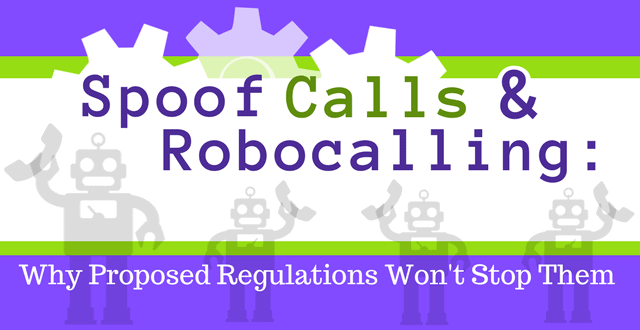
The Federal Communications Commission (FCC) is working on a regulation to attempt to alleviate the surge of spoof calls and Robocalling. Will this actually have any effect in the long run?
What the FCC sees as a simple proposed rule change may really just be a big waste of time.
FCC 17-151 Advanced Methods to Target and Eliminate Unlawful Robocalls is a regulation the FCC is putting forth in the hopes of providing relief to phone subscribers from unwanted or illegal robocalling. The report outlines the issues related with robocalls: how phone numbers are being used to entice, annoy, or defraud telephone subscribers.
Currently providers are not allowed to block phone numbers from making outgoing calls. This regulation seeks to allow providers the right to block phone numbers if they are deemed to be illegal or malicious.
This will allow various types of phone numbers to be included in the “Legal to Block” category:
- Phone numbers flagged for Do Not Originate (DNO)
- Calls coming from invalid phone numbers
- Calls purporting to originate from unused numbers
While this sounds like a great thing – and on paper it is – there are some issues.
First, as the Public Switched Telephone Network (PSTN) and National Number Plans stand today, there is a huge amount of misconfiguration and human error. These require accurate information, from both providers and consumers, in order to determine validity of phone numbers. But we all make mistakes, right? Improper configuration can cause valid numbers to be flagged, and possibly blocked, incorrectly. That all just sounds like a headache waiting to happen.
How will providers know what is a DNO, invalid, or unused number? Carriers obtain some information from national databases that help in the correct routing of phone calls. Will there be a mandate from the FCC to add additional steps to number verification? This may mean a whole new level of regulations laid upon traditional and incumbent carriers, adding more hurdles to leap in order to get your phone system set up and maintained.
This action raises more questions: is consent required to block calls reaching a consumer? Will there need to be a submission process for providers to block numbers? We are working with the same flawed systems that created some of these issues to produce a solution. Will there be recourse for consumers to reverse erroneously blocked calls and undo steps for mistakenly blocked legitimate numbers? This is already part of the next conversation with the FCC as rule-making continues.
Let’s look at the mindset of the target of this regulation. We are trying to curtail the actions of people who are committing illegal acts in a malicious attempt to steal from the pockets of the public. Don’t you think the offenders who benefit from spoof call will come up with work-arounds? Won’t it just be a matter of time before these scammers find a new way to bypass any changes made within this regulation? There has been scam calls for years. Now, they are already changing their tactics and using local numbers – or even one of your friend’s or family’s – to trick you into giving them your information.
NBC did a news report on the issue of scammers using fake caller I.D. information:
To summarize, here are key issues with the proposed regulation:
- The regulation does not account for human error. Phone systems that are configured incorrectly may be wrongly flagged and blocked, causing a big headache.
- How accurate can the regulation actually be when determining invalid numbers? Will this require even more mandates to be implemented?
- Will this work long term? The illegal robocallers are using strategic methods to appear legitimate. How long after this regulation is implemented until a new work-around is discovered?
We acknowledge that illegal number spoofing is an abuse of the system. Will regulations and rules created by the FCC actually curtail the practice, or will it burden carriers with monitoring and attempting to impede a moving target?
Check out the FCC filing for full details on the document released on November 17th, 2017. Even the candid statements at the end of the docket are worth the read. You tell us: are the commissioners clued in on the possibilities of technological deterrents to illegal activity?


